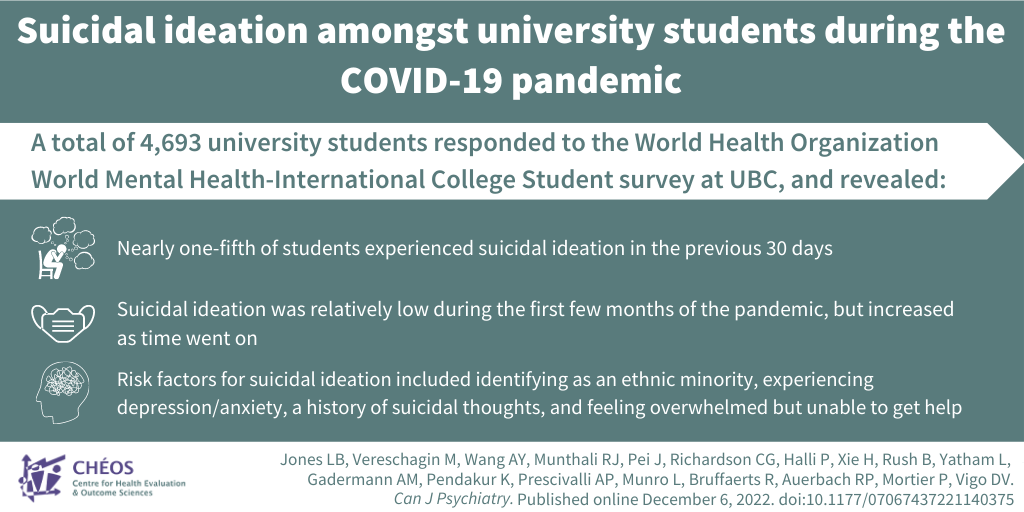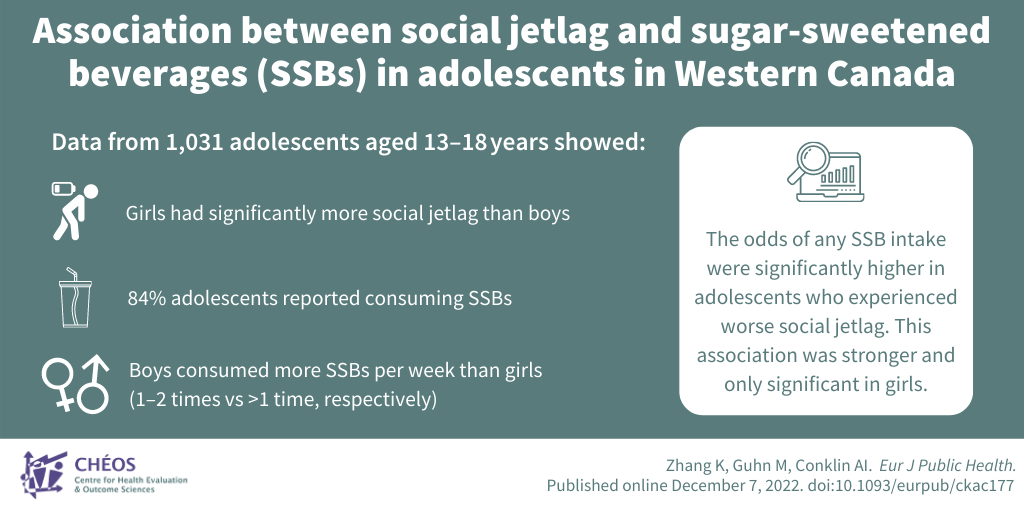The Evidence Speaks Series is a recurring feature highlighting the latest in CHÉOS research. This series features summaries of select publications and is designed to keep media and the research community up to date with CHÉOS’ current research results in the health outcomes field.
To ensure this research is quick and easy to share, we are now providing social cards that you are free to save and use as you see fit.
Students have been resilient during COVID-19, but some groups could benefit from more mental health support
Jones LB, Vereschagin M, Wang AY, Munthali RJ, Pei J, Richardson CG, Halli P, Xie H, Rush B, Yatham L, Gadermann AM, Pendakur K, Prescivalli AP, Munro L, Bruffaerts R, Auerbach RP, Mortier P, Vigo DV. Suicidal Ideation Amongst University Students During the COVID-19 Pandemic: Time Trends and Risk Factors. Can J Psychiatry. Published online December 6, 2022.
Using data collected through the World Health Organization World Mental Health-International College Student survey, CHÉOS Scientists Drs. Chris Richardson, Anne Gadermann, and Daniel Vigo explored trends in suicidal ideation among 4,693 UBC students during the COVID-19 pandemic. The research team found that, while around one-fifth of respondents experienced suicidal ideation in the previous 30 days, the general university population appeared to be relatively resilient, particularly during the first few months of the pandemic. They also found that risk factors for experiencing suicidal ideation included identifying as an ethnic minority (excluding First Nations, Inuit, or Métis), having existing symptoms of anxiety or depression, having a history of suicidal thoughts, and feeling overwhelmed but unable to access help. These results could support the development of policies and interventions to support at-risk groups within universities.

—
People who have been diagnosed with TB are more likely to experience multiple comorbidities than those who have not
Basham CA, Karim ME, Johnston JC. Multimorbidity prevalence and chronic disease patterns among tuberculosis survivors in a high-income setting. Can J Public Health. Published online December 2, 2022.
There is a lack of data regarding how prevalent multimorbidity, defined as the presence of at least two chronic health conditions, is among tuberculosis (TB) survivors who live in high-income, low-TB incidence settings. CHÉOS’ Dr. Ehsan Karim recently studied the prevalence of multimorbidity and chronic disease patterns among TB survivors who immigrated to B.C. in 1985–2015. Analyzing data from 1,962 TB survivors and 1,962 non-TB controls, the study determined that people who survived TB had a 74 per cent higher prevalence of multimorbidity and a 116 per cent higher prevalence of complex multimorbidity (at least three comorbidities) compared with those who did not have a history of TB. It was also determined that there were differences in the most frequent chronic diseases between the two populations; for example, diabetes, liver disease, depression, and hypothyroidism were found to be more prevalent among TB survivors. These findings indicate that specialized multimorbidity screening and subsequent patient-centred care could benefit people who have survived TB.

—
Social jetlag is associated with sugary drink consumption among girls
Zhang K, Guhn M, Conklin AI. Association between social jetlag and sugar-sweetened beverages (SSBs) in adolescents in Western Canada. Eur J Public Health. Published online December 7, 2022.
Social jetlag is the difference between someone’s natural body clock (when they naturally sleep or wake up) and their socially determined clock (when they need to sleep or wake up). CHÉOS Scientist Dr. Annalijn Conklin investigated whether there was a link between social jetlag and the consumption of sugar-sweetened beverages (SSBs), like soda and sports drinks, among adolescents. Using data from 1,031 adolescents in B.C. aged 13–18 years, the research team determined that girls experienced more social jetlag than boys (1.64 hours versus 1.52 hours, respectively), and while most adolescents reported consuming SSBs, boys generally consumed them more frequently than girls. Upon further investigation, the researchers found that the consumption of any SSB was associated with higher levels of social jetlag, but this was only significant among girls. These results could be used to inform public health strategies to reduce sugary drink intake by better understanding the role of sleep debt and social jetlag, particularly among girls.
Look out for a full story on this paper in early 2023!




